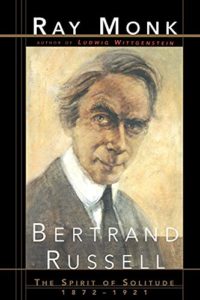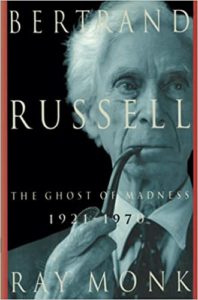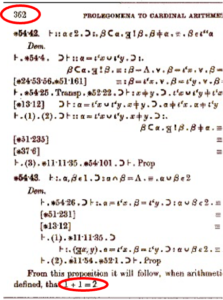 |
 |
Remember those sixth-form days when some of us were first thrilled by newly awakened intellectual abilities? We were quick to challenge traditional beliefs and the status quo, and eager to show off our acquaintance with the works of Bertrand Russell. The name Bertrand Russell was whispered with hush awe and quiet reverence. Russell represented to us the ideal of a socially engaged intellectual. Never mind that we couldn’t really understand his more technical papers on mathematical logic. His more popular written books such as Why I Am Not a Christian, Principles of Social Reconstruction and A Free Man’s Worship were sufficient to persuade us to adopt him as an inspiring icon for rebellion. His status as a Nobel Prize laureate decisively clinched an unquestioned hearing from skeptical students.
However, when I actually got down to read Russell for myself, particularly his book Why I Am Not a Christian, I found myself in for a great disappointment. Russell, who was arguably the most outstanding mathematical logician of his day, turned out to be illogical in his analysis of Christianity. He relied on a shoddy knowledge of Christianity. His analysis was full of non-sequitur and question-begging arguments with much scorn and rhetoric thrown in. I concluded that a more fitting title for the book would be Why I am too Prejudiced to Become a Stereotyped Christian.
My suspicion was confirmed when I turned to Russell’s famous BBC radio debate with the Christian philosopher, Frederick Copleston. The topic of the debate centred on the existence of God. Copleston was by reputation the younger underdog. But Copleston who has since given us a nine-volume work, A History of Philosophy which is still regarded as the best work in the field, was not intimidated. With verve and competence he threw the gauntlet down with three concise arguments for the existence of God. Even with the little philosophical knowledge I possessed at that time I could see that Russell was on the defensive on all three counts in that memorable encounter. I have since then repeatedly challenged name droppers of Russell to read the debate for themselves. To date I have not met someone who came back with a score card in favour of Russell. [Re: Transcript of the Russell/Copleston radio debate]
Russell’s monumental three-volume work, The Principia Mathematica which he co-authored with the polymath Alfred Whitehead, led some of his admirers to laud him with the astounding claim to be the second Aristotle. Page 362 of the second volume of the book gives a glimpse into the the technicality of the their project of laying the logical foundation of mathematics.

Whitehead and Russell took 86 pages in vol. 2 of Principia Mathematica to prove that 1 + 1 = 2!
Unfortunately, the book, which sought to demonstrate mathematics as the ideal form of knowledge because it is based on strict deduction, was shattered by a younger genius, Kurt Godel. Godel demonstrated that any attempt to construct a sufficiently complex mathematical system must inevitably give rise to internal contradiction. So much for Russell’s ten years of work to base knowledge on mathematical deductive certainty. Since then, Russell’s reputation has waned. He was eventually overshadowed by colleague, Ludwig Wittgenstein.
Nevertheless, it cannot be denied that Russell bequeathed to English philosophy a style marked by clarity and careful analysis. While we may complain that in the quest for clarity, English analytical philosophers have appeared sterile, we cannot fault them for obscurantism which other philosophers are prone to. We must remember that Russell was himself awarded the Noble Prize for literature. His writings, indeed, were marked by uncommon wit and lucidity.
What about the man himself? What sort of person was Russell? We are indeed fortunate to have an autobiography written by Russell himself. However, like many autobiographers, Russell was guilty of hiding embarrassing details and exaggerating his own significance in his relationships. This was evident in the way he described his relationships with Joseph Conrad and D. H. Lawrence. A more carefully documented and objective biography has been a desideratum for some time. We therefore greet with excitement and anticipation the new biography of Russell by Ray Monk entitled, Bertrand Russell: The Spirit of Solitude 1872 – 1921.
Monk writes as an accomplished biographer who authored an award winning biography on Ludwig Wittgenstein. In his work on Bertrand Russell, Monk again displays his gift as a compelling story teller. Furthermore, he comes equipped with the prerequisite knowledge as a philosophy lecturer on to expound Russell’s philosophical works. In a sense, a good intellectual biography should send us rushing back eagerly to read for ourselves the primary sources. Additionally, a good intellectual biography on its own terms should seek also to demonstrate how ideas evolve and integrate coherently in the subject’s life project. Monk excels on all these counts.
Monk’s exposition on Russell’s technical philosophy is a model of lucidity. The ever flattered “intelligent lay reader” should have no problem grasping Monk’s exposition of Russell’s foundational ideas that were couched in technically inaccessible symbolic logic. More significantly, he enables us to peer into the deep and powerful forces that impelled Russell to create knowledge based on new and secure foundations. In Russell, we find a rare embodiment of intellectual passion.
But something seems amiss as Monk’s story telling unfolds. While Monk obviously wrote with fondness for his subject in his earlier charming biography on Wittgenstein, he is unable to hide his dislike for Russell in the current biography. His portrait of Russell seems to contrast the image of Russell as the admirable social reformer that we were familiar with.
Russell emerges as a loner who is cold and manipulative. Hence, the subtitle of the book, The Spirit of Solitude. In his more youthful years, Russell appeared to be a goody grandson. But as soon as he came of age, he quickly asserted his independence and rebelled against his grandmother who brought him up after the death of his parents. His letters to his first wife, Alys, during their courtship would rival those of Cyrano of Bergerac. But shortly after marriage the prize in hand quickly lost its attraction. Russell moved from one affair to another, some of which involved the wives of his colleagues. Russell’s hunger for intimacy would elicit our sympathy were it not for the tragic consequences of betrayal of love. Russell longed to be loved, but his love affairs failed because he could not help exploiting those whom he ‘loved’.
Monk furnishes us with a most telling expose of Russell’s fears found in Russell’s own description of his recurring dreams, “I imagine myself behind plate glass, like a fish in an aquarium, or turned into a ghost whom no one sees; agonizingly I tried to make some sort of human contact but it is impossible & I know myself doomed forever to lonely impotence. I used to have this feeling often before I had children; since then it has been rare.”
Another startling disclosure reveals that Russell was haunted by an anxiety that he could go mad any moment because of genetic inheritance. His memories of an uncle who killed someone in a violent fit of madness aggravated his fears following an incident in which he found himself almost choking to death his good philosopher friend G.E. Moore.
Dare we surmise from these details of anxieties and betrayals the reasons for Russell’s unusual hostility towards Christianity? Nothing generates a more vehement protest than a guilty conscience. Indeed, for all his bravado against religion, Russell once found himself confessing his sin and also experiencing a ‘conversion’ experience. But alas, this moment of revelation appeared to be short-lived and only served to heighten his hostility. Russell epitomizes the substance of Francis Thompson’s immortal lines “I fled him down the arches of the years; I fled him down the labyrinthine ways of my own mind; and in the midst of tears I fled from him, and under running laughter.” But unlike Thompson, Russell successfully resisted the ‘hound of heaven’ all his life.
By all accounts Russell appears to have lived a rich and enviably full life. To be sure, his dearest ambition to solve once and for all the problems of philosophy on indubitable mathematical foundations ended up shattered. Indeed, I detect a tinge of sadness in his acknowledgement that he had only contributed ‘a little’ to mathematics.
The biography ends with an account of Russell’s new marriage and glimpses of happiness after he became a father in his fifties. Can the passionate skeptic come to terms with the limits to his intellectual powers after having being a youthful genius? Can he settle down to a mundane life and commit himself to a faithful relationship? Will lifelong accumulated wisdom help him in fighting the cause of justice? Undoubtedly some of his close friends will protest that Monk was too prejudiced and judgmental concerning Russell’s relationships and instead insisted on his more benevolent nature. Perhaps Russell did mellow with age.
These are teasing questions. On my part I cannot help but be struck by the sad confession of a rare and powerfully gifted individual trying to live a stoical life without God. Russell wrote,
Through my long years
I sought peace,
I found ecstasy, I found anguish,
I found madness,
I found loneliness,
I found the solitary pain
that gnaws the heart,
But peace I did not find.
Bibliography
Ray Monk, Bertrand Russell: The Spirit of Solitude 1872-1921
(Free Press. Reprint ed., 2016).
Ray Monk, Bertrand Russell: The Ghost of Madness 1921-1970,
(Free Press. Reprint ed. 2016).
Note:
This review covers only vol. 1 of Ray Monk’s two-volume biography on Bertrand Russell since my interest is on Russell the philosopher. Vol. 2 covers how Russell transformed himself from a major philosopher into a political activist and a popular writer.